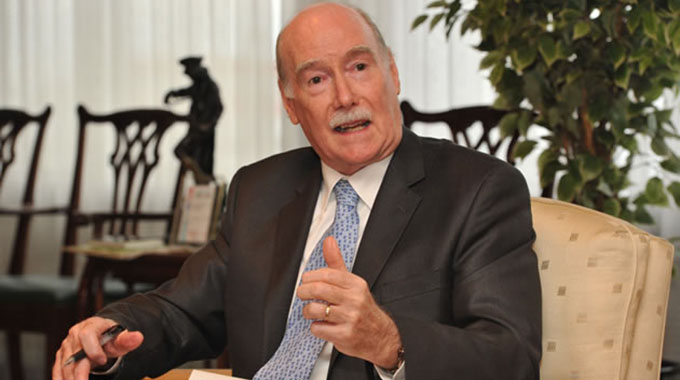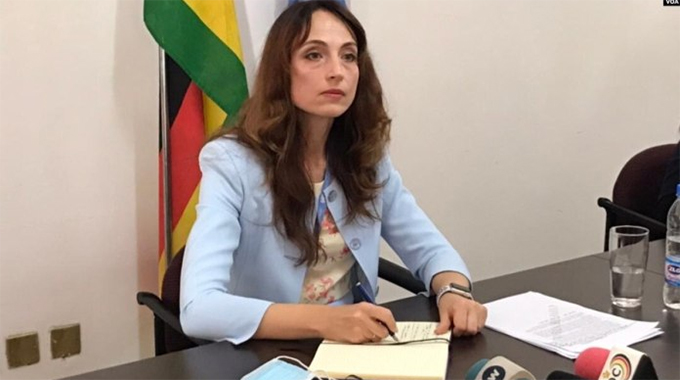Nations endorse UN report on sanctions

Herald Reporter
WORLD nations have endorsed findings and recommendations contained in the final report of the United Nations Special Rapporteur on the negative impact of unilateral coercive measures on the enjoyment of human rights, calling for the unconditional removal of the punitive measures.
The report was presented to the UN Human Rights Council in Geneva, Switzerland on Wednesday by Professor Alena Douhan, the UN Special Rapporteur who visited Zimbabwe on a fact-finding mission in October last year.

Professor Alena Douhan
Invited by the president of the Council to deliver initial comments on the report, Zimbabwe’s Ambassador to the United Nations in Geneva, Ambassador Stuart Comberbach, expressed hope that the findings would cause those who continue to impose sanctions on Zimbabwe “to reflect, re-think and re-engage”.
Forensic and comprehensive in its content, the report details the widespread collateral damage inflicted across all socio-economic sectors by Western sanctions first imposed more than 20 years ago.
In so doing, the report contradicts and indeed challenges the repeated assertions by those who impose sanctions that their “restrictive measures” are targeted in nature and do not have any impact beyond those so-targeted.
In his address to the Council, Ambassador Comberbach said: “As Government, we are satisfied that her findings bear our long-held position — namely that sanctions have inflicted very significant harm upon lives and livelihoods in our country, have impeded socio-economic development and have severely undermined Government’s capacity to more effectively fulfil its obligations with regard to the provision of affordable basic services to our people.
“The report accurately reflects the extent of damage across all sectors of socio-economic development — most specifically the impact of being completely cut-off from sources of international finance, affordable trade-credit facilities and longer-term concessionary funding essential if we are to develop, to modernise, to industrialise and to (be able to) compete effectively within both a continental and global setting.”
Praising Zimbabwe’s Southern African neighbours (SADC) for their consistent support towards the lifting of sanctions, Ambassador Comberbach observed that “secondary sanctions, extensive over-compliance by banks and foreign companies and a pervasive fear of eye-watering penalties for even inadvertent contravention of Western sanctions have also impacted upon our neighbours, on regional trade and on the pace of our regional integration process”.
The Ambassador noted that SADC’s annual “remove-the-sanctions” (Anti-Sanctions Day on October 25) call had been repeatedly echoed by the African Union (AU), the Non-Aligned Movement (NAM), the Group of 77 and China and by the Organisation of African, Caribbean and Pacific States (OACPS).
“Notwithstanding these growing calls, those who impose sanctions continue to deny that they have any impact beyond the so-called targeted few, or on Zimbabwe’s economic performance as a whole,” said Ambassador Comberbach.
He pointed out that “the cynical irony of that position is well-articulated in the Report”, and reminded the Council of a telling observation made by Ms Michelle Bachelet, the just-departed High Commissioner for Human Rights, in her address to the 48th Session of the Council (2021) when she cautioned that “human rights cannot be adequately protected, indeed they are profoundly undermined if sanctions and the means of enforcement, themselves, violate human rights”.
Ambassador Comberbach welcomed the Special Rapporteur’s call for “structured dialogue” as a means of settling any disputes, “within the rule of law”. He noted that this call closely mirrored that repeatedly made by the President of Zimbabwe, for dialogue, both internally and externally.
“Internally, he (the President) has urged all political leaders to come together within the Political Actors Dialogue, to promote the search for practical solutions to the challenges facing the nation.
“Externally, the President has consistently called for engagement and dialogue with those who have imposed sanctions: similar to the political dialogue mechanism with the European Union which, over the years, has seen the EU moving to ease some of its long-standing punitive measures,” said Ambassador Comberbach.
“Regrettably, others to whom the Special Rapporteur makes reference in her report — have chosen to ignore such calls, have maintained and even tightened their sanctions regimes, continuing to brush aside the growing empirical evidence — as confirmed in this Report — of the widespread collateral damage inflicted thereby.”
He ended his remarks by stating that “our hope is that this report will be taken seriously: that it will provide food for thought to all those who continue to impose sanctions against Zimbabwe and that it will cause them to reflect, to re-think and to re-engage”.
Taking the floor during the inter-active dialogue session which followed Ambassador Comberbach’s intervention, a number of SADC member states, other African countries and many from much further afield, expressed their strong rejection of sanctions as a coercive tool of western foreign policy, lamented the widespread harm inflicted upon lives and livelihoods in the targeted countries and condemned the illegal nature of such measures imposed, unilaterally, in contravention of the UN Charter, international law and international humanitarian law.
Countries that took the floor to reinforce this principled stance included Cote d’Ivoire (speaking on behalf of the entire Africa Group of Ambassadors in Geneva), Egypt, South Africa, Botswana, Malawi, Mozambique, Sudan, Namibia, Cameroon, Benin, Cuba, Venezuela, Cambodia, Malaysia, Russian Federation, Belarus, China, Pakistan, Bolivia and Iran.
The single dissenting voice in the debate thus far came from the European Union which insisted that the “autonomous restrictive measures” imposed by the Union were “targeted” and were not punitive in nature beyond the individual or entity so targeted.
Apart from Ambassador Comberbach, the Zimbabwean delegation comprised Deputy Permanent Representative to the UN Nesbert Samasuwo and Minister Counsellor Charles Chishiri from the Zimbabwe Mission in Geneva, Secretary for Justice, Legal and Parliamentary Affairs, Ms Virginia Mabiza, Deputy Attorney General, Ms Fortune Chimbaru, Head of the OPC’s Anti-Corruption Unit, Mr Thabani Mpofu, Chief Director in the Ministry of Justice, Mr Tapiwa Godzi and other senior officials.
The three-hour debate continued yesterday with interventions by Civil Society Organisations and NGO formations.
The report was expected to be adopted by the Council at the end of the debate.









Comments